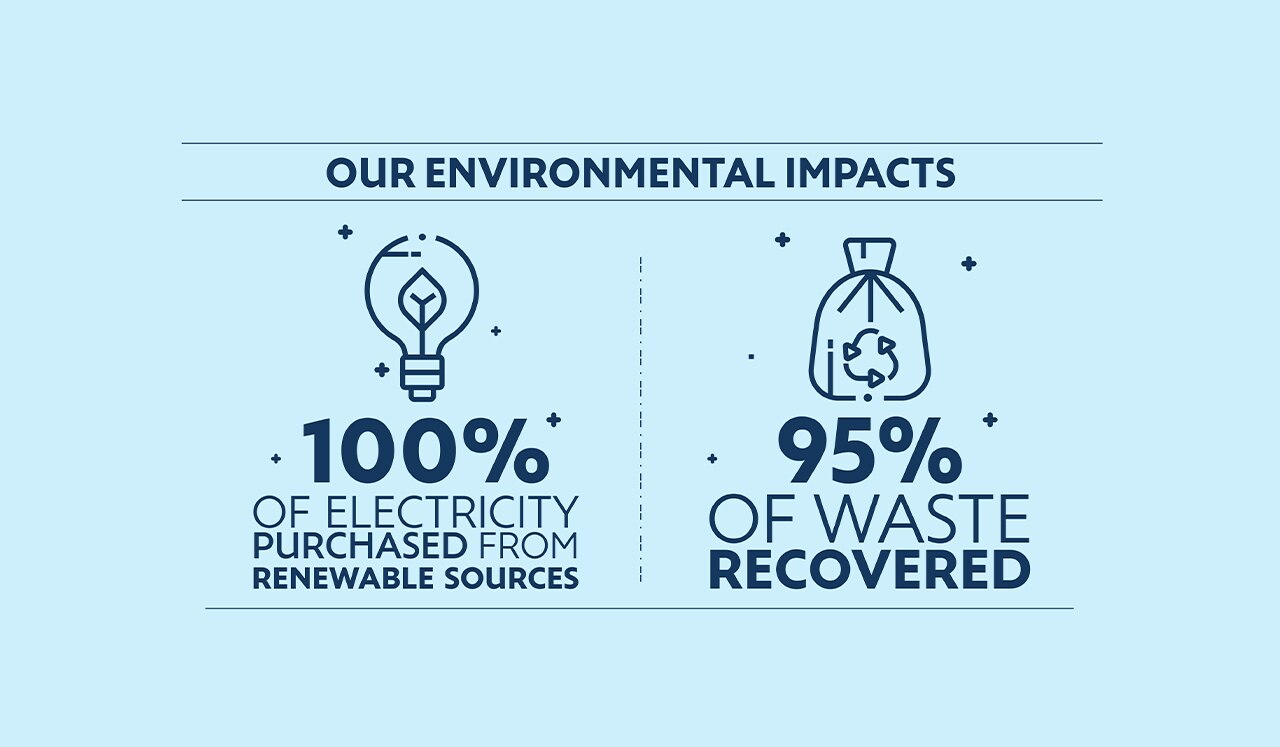We are on a journey to reduce our impact through key actions across our entire value chain.
We are using Life Cycle Assessments to measure our emission
To understand our emissions hotspots, in 2018 for the first time we measured our carbon footprint with a Life Cycle Assessment: a scientific method for analysing the GHGs (Greenhouse Gases) of a product or brand throughout its lifecycle. The LCA was conducted by independent experts RDC and peer-reviewed by external consultants Quantis.
The first LCA undertaken for S.Pellegrino natural mineral water revealed that around 87% of our emissions worldwide were in packaging and logistics, so we focused special attention on these areas, before conducting a second LCA in 2021, in 2022 and again in 2023. This showed significant reductions in emissions in carbon intensity (compared to the baseline 2018) in all major areas of impact.

Certified carbon intensity reduction
Our efforts to reduce our emissions in terms of carbon intensity (expressed in grams per litre for our bottles) have been recognised with certification by Carbon Trust, a leading independent partner in carbon footprinting engaged in helping companies effectively measure, manage and reduce their footprints.
All S.Pellegrino products sold in the UK have shown a reduced environmental impact (measured in carbon intensity per bottle) in 2022 compared to 2018. This can be attributed to a 30% increase in the use of recycled plastic (rPET) as well as using recycled plastic in our film packs and lightening overpack where possible. What’s more, we have taken steps to optimise logistics, increasing transport by rail (63% of overall km in 2023) and boat (23% in 2023), and introducing low-carbon fuels such as bio-LNG.

We are striving for efficiency in our plant
At our plant in San Pellegrino Terme, near Bergamo, we maximize the efficiency of all daily activities, with the final objective of reducing the environmental impact of our operations as much as possible. The main areas of attention include water management in the plant and emissions’ reduction. Thanks to this approach we saved over 194 million litres of water between 2018 and 2023. Moreover, since 2011, 100% of our purchased electricity has come from renewable sources.
Furthermore, we implement strategies aimed at recovering waste materials for reuse, transforming waste into a resource. To this end the Group has an agreement with HeraAmbiente, which ensures that 100% of waste from the plants is recovered.

Re-imagining our plant with the environment and wellbeing in mind
The home of S.Pellegrino natural mineral water will soon become even more eco-friendly, as our plant in Val Brembana is being radically renovated. Designed by the award-winning Bjarke Ingels Group, it embraces the concept of Hedonistic Sustainability: sustainable architecture integrated with its natural surroundings, which increases well-being and pleasure for society.
The innovative construction of this new Factory of the Future will help mitigate the plant's environmental impact, thanks to emissions-reducing features like LED lighting, photovoltaic panels and a heat recovery system. It will also aim to operate on a “zero water impact” model, reusing rainwater and process water for irrigation, building services and factory processes.
Moreover, by creating a new route for trucks, it significantly reduced the impact of traffic in the valley.

We are working on reducing our packaging to reduce our environmental impact
We are striving to identify and eliminate every piece of packaging that is not strictly essential to our products. In that way, our packaging can become lighter, more efficient to transport and easier to recycle every day. Just one way of reducing our environmental impact, step by step.

We are moving towards greener transport
We want to minimise the impact of transporting our products. In recent years, we have prioritised rail transport wherever possible, favouring load optimisation, creating strategic logistics partnerships, and using cutting-edge vehicles fuelled by both liquefied natural gas (LNG), bio LNG (a biological liquefied natural gas that greatly reduces CO2 emissions).


